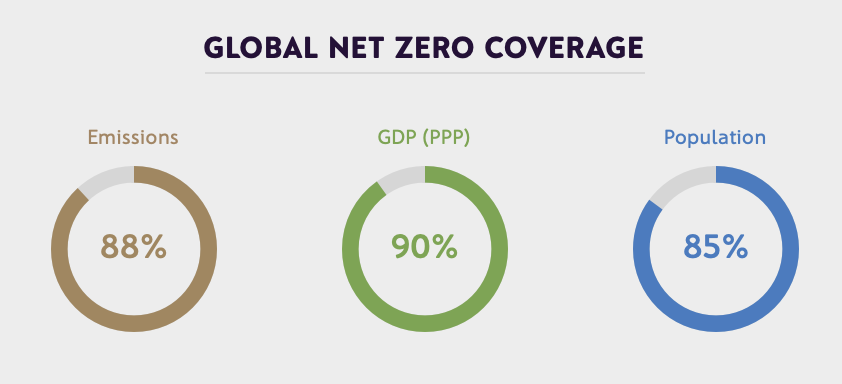What is net zero?
Countries, cities, and companies are increasingly committed to reaching net zero – removing as much CO2 as they produce to limit global warming. Emissions reduction pledges aim to avoid the worst impacts of climate change, with 2050 as the most-cited horizon. But what does that really mean?

What exactly does net zero mean?
In simple terms, reaching net zero emissions means removing as much carbon as we put into the atmosphere.
Under the Paris Agreement, signed in 2015, 193 parties –192 countries plus the European Union– pledged to keep the global temperature rise “well below” 1.5°C to avoid the most severe consequences of climate change. Global emissions must fall by about 45% by 2030 against a 2010 baseline. All remaining emissions must be balanced by sequestering CO2 from the atmosphere to reach net zero by 2050.
All net-zero pledges must align with the Paris Agreement. Beyond national targets, companies and other organisations can also contribute to the global effort by establishing goals of their own.
Who has committed to reaching net zero?
As pledges from countries, cities, and organisations proliferate, the net zero promise has become a mainstream act.
The Net Zero Tracker, a multi-stakeholder initiative that maps the number and quality of climate pledges, estimates that 90% of the global economy is committed to reaching net zero. Country-level commitments cover 88% of global emissions and include 85% of the population (as of January 2022). Out of 2 000 of the largest publicly traded companies worldwide, the Net Zero Tracker has identified 683 with a net zero target.

Simultaneously, the EU aims to be the world’s first net zero continent and is tightening its energy politics and regulations. It is also the first region to put the net zero target into law.
The Corporate Net Zero Standard: setting credible goals
On an organisational level, the quality of the net zero targets varies. While some companies have set ambitious goals that require deep emissions cuts, others have set modest commitments lacking detailed abatement planning.
The Science Based Targets Initiative’s (SBTi), a partnership of leading environmental organisations, created the Net Zero Standard to give substance to corporate targets. The guidance provides a common, robust, and science-based understanding of net zero and a methodology for companies to do their part in enabling a low-carbon global economy.
Reaching net zero in line with the Net Zero Standard must cover two further conditions:
- To achieve a scale of value-chain emission reductions consistent with the depth of abatement achieved in pathways that limit warming to 1.5°C with no or limited overshoot.
- To neutralise the impact of any source of residual emissions that remains unfeasible to be eliminated by permanently removing an equivalent amount of atmospheric carbon dioxide.
The private sector has the power to drive progress in the race against climate change. Read more about Ecohz’ sustainability solutions or contact our team of experts for personalised guidance on the journey to net zero.
Net Zero Roadmap
Net Zero Roadmap is an advisory service that tailors solutions for companies striving to slash their greenhouse gas emissions.

Webinar: Walking the Path to Net Zero
Ecohz held a webinar presenting the basics of net zero and explained what tracing a robust, future-proof plan to achieve it entails.
Do you want to know more about our solutions to reduce emissions? Let's have a chat.
Get in touch
Nils Holta
Net Zero Advisor

Madeleine Mowinckel
Head of Advisory & Services